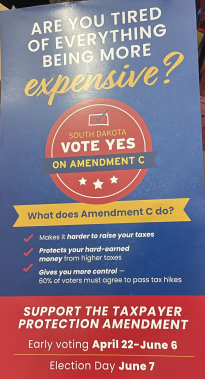What is Amendment C

Photo provided by David Bomhoff
An example of mail South Dakotans may receive in the mail talking about Amendment C that does not fully inform voters.
May 11, 2022
In the June 2022 primaries, South Dakotans will vote on Constitutional Amendment C, a 60% vote requirement for ballot measures increasing taxes or appropriating any measure which costs $10 million or more in the first five years of enactment. Currently, a simple majority vote (50%+1) is needed to pass ballot measures in South Dakota. This would mean that many issues, such as medical marijuana, could remain stagnant if Amendment C is passed. It would end the tradition of majority rule for ballot measures in South Dakota and create an opening for a situation in which just 41% of voters could approve a ballot measure that cuts funding to policies and programs like rural hospitals and clinics, schools, nursing homes, law enforcement and more.
There is controversy over this amendment because people believe that Kristi Noem and South Dakota legislators would get all of the power rather than South Dakota voters if this voting threshold becomes part of the state constitution. It would keep more power in the hands of state lawmakers to have more control over measures and laws that are brought forth by South Dakota citizens. Many also argue that there is no need to raise the voting threshold from 50% to 60% majority, as the basis of democracy is majority rule. Having this vote in the primaries raises a lot of concern for some South Dakota voters because of the considerably lower voter turnout for the primaries than the November general election.
Like any issue that is being voted on or discussed, there is a lot of misinformation being spread. Amendment C is predominantly advocated for by showing voters that it will make it harder to raise taxes and that it protects their “hard-earned money” from higher taxes. As shown in the photo above, advertisements urge voters to vote “Yes” on Amendment C because of these tax-related aspects of the amendment. This leads many voters to be misinformed about the true goal of the amendment and its other implications. Many fail to recognize that passing Amendment C will make it harder to pass many other bills besides tax raises because it also concerns issues that would cost the state more than $10 million in the first five years. This would directly impact the recent Medicaid expansion initiative, which intend to provide medical coverage for low-income individuals, as well as many other initiatives and movements. Many supporters of Amendment C fail to recognize these negative impacts of the amendment when targeting rural South Dakotans. Supporters claim that voting “Yes” will allow them to have a voice in South Dakotan issues, despite the state’s growing population centers and progressive demographics. This abundant misinformation is why it is crucial to stay informed of what is on the ballot, rather than believing deceptive marketing.
This is not the first time South Dakota has voted on an amendment like this, as a nearly identical ballot question was voted down by South Dakota voters in 2018. Currently, South Dakota is one of 38 states that requires a simple majority vote (50%+1) for a proposed constitutional amendment to be adopted. In 11 states, voters must approve a proposed constitutional amendment by more than a simple majority or by some rule that uses a combination of different criteria. Florida requires a two-thirds (66.67%) supermajority vote for the approval of constitutional amendments which create a new tax or fee. The requirement was implemented through voter approval of Amendment 5 in 2018, similar to Amendment C’s intent.
For any LHS students or staff who are able to vote, the voter registration deadline is May 23, absentee voting begins May 23, and polls are open on June 7 from 7 a.m. to 7 p.m. To register to vote or to check your registration, visit www.sdsos.gov








